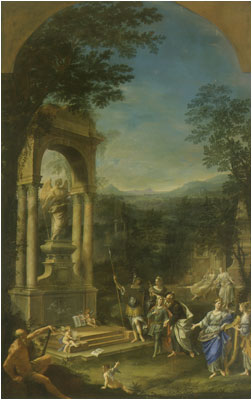
The English essayist and politician Joseph Addison (1672-1719) founded the "Spectator" periodical with Sir Richard Steele.
Profile Of Joseph Addison
Born: 1 May 1672
Birthplace: Milston, Wiltshire, England
Died: 17 June 1719
Location of death: London, England
Cause of death: unspecified
Remains: Buried, Poets' Corner, Westminster Abbey
Gender: Male
Ethnicity: White
Occupation: Author, Playwright
Nationality: England
Joseph Addison's Quotes
A man should always consider how much he has more than he wants.
Knowledge is that which, next to virtue, truly raises one person above another.
It is a great presumption to ascribe our successes to our own management, and not to esteem our selves upon any blessing, rather as it is the bounty of heaven, than the acquisition of our own prudence.
Music, the greatest good that mortals know, and all of heaven we have below.
Our real blessings often appear to us in the shape of pains, losses and disappointments; but let us have patience and we soon shall see them in their proper figures.
The truth of it is, learning, like travelling, and all other methods of improvement, as it finishes good sense, so it makes a silly man ten thousand times more insufferable, by supplying variety of matter to his impertinence, and giving him an opportunity of abounding in absurdities.
A perfect tragedy is the noblest production of human nature.
True happiness arises, in the first place, from the enjoyment of one's self, and in the next, from the friendship and conversation of a few select companions.
Many persons have a wrong idea of what constitutes true happiness. It is not attained through self-gratification but through fidelity to a worthy purpose.
The disease of jealously is so malignant that is converts all it takes into its own nourishment.

Allegorical Tomb of Joseph Addison (1642-1719) Essayist and Poet
Irregularity and want of method are only supportable in men of great learning or genius, who are often too full to be exact, and therefore they choose to throw down their pearls in heaps before the reader, rather than be at the pains of stringing them.
Our delight in any particular study, art, or science rises and improves in proportion to the application which we bestow upon it. Thus, what was at first an exercise becomes at length an entertainment
It was said of Socrates that he brought philosophy down from heaven to inhabit among men; and I shall be ambitious to have it said of me that I have brought philosophy out of closets and libraries, schools and colleges, to dwell in clubs and assemblies, at tea-tables and in coffee-houses.
There is nothing that makes its way more directly to the soul than beauty.
The woman that deliberates is lost.
I value my garden more for being full of blackbirds than of cherries, and very frankly give them fruit for their songs.
When I read the several dates of the tombs, of some that died yesterday, and some six hundred years ago, I consider that great day when we shall all of us be contemporaries, and make our appearance together.
Arguments out of a pretty mouth are unanswerable.
There is not any present moment that is unconnected with some future one. The life of every man is a continued chain of incidents, each link of which hangs upon the former. The transition from cause to effect, from event to event, is often carried on by secret steps, which our foresight cannot divine, and our sagacity is unable to trace. Evil may at some future period bring forth good; and good may bring forth evil, both equally unexpected.
A contented mind is the greatest blessing a man can enjoy in this world.
What sculpture is to a block of marble, education is to an human soul.

No comments:
Post a Comment